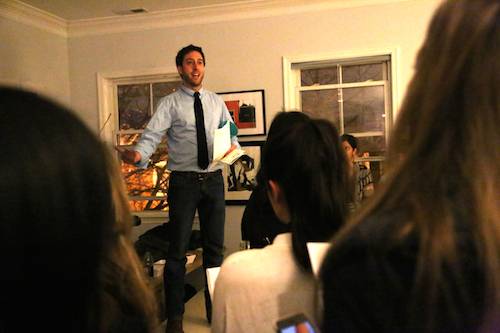As a community magazine, people come and go constantly from SP — which is kind of a positive thing about it from which to begin. People move through this community and keep things flowing. New writers, editors, and all of that, all the time. It keeps things fresh.
Editor-in-Chief Emeritus and co-Founder of SP, Chris Maier, was recently featured for the growing trend of Little Salon which has been creating some buzz in the Washington, D.C. area. Though this article was published about a month ago, it’s definitely worth mentioning here.
Check out some of the information below, and go ahead and read the whole thing (linked above):
On a Tuesday night in July, in a Harvard Street NW rowhouse that looked like any other, Charlie Nilles hoisted his 35-pound bass over a sea of people chatting and drinking wine on the staircase, filling the living room and spilling into the kitchen and foyer.
Nilles gingerly set the instrument down next to Mark Evans‘ cello. All heads turned toward the string musicians, both members of the National Symphony Orchestra and a smaller ensemble, the LeDroit Chamber Players. They picked up their bows and glided into “Duo,” a piece they’d transcribed for cello and bass. The room fell silent. The wine-drinking paused. There was no icy glow from a cell phone. The entire crowd was mesmerized by the musicians, close enough to touch, serenading them in the middle of a Columbia Heights row house.
This is the magic of Little Salon.
Conceived by fiction writer Chris Maier (below), Little Salon brings high-quality art to informal settings, with no ticket prices or exclusive invitations. Next month, the event will celebrate its first anniversary of monthly gatherings in D.C. residences.
At the July show, the “stage” between the fireplace and makeshift wine bar featured poetry, another piece by the LeDroit Chamber Players (this time, a Béla Fleck song originally composed for banjo), and short fiction.
“A lot of us arrive at genres of art with preconceptions of what that art is supposed to be, and how accessible it’s supposed to be, and who it’s supposed to be made for,” Maier said. “If we can challenge those things, and do it in a fun, conversational, unpretentious space…it’s good for everyone.”
Good stuff, Chris!










